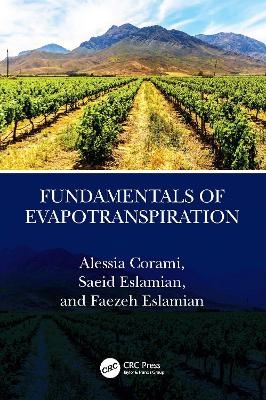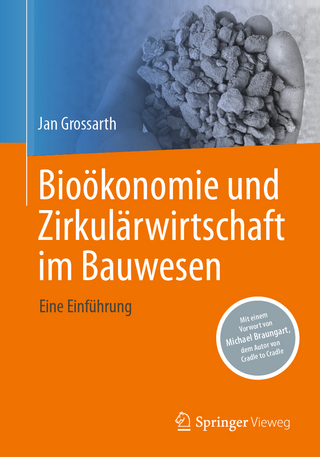
Fundamentals of Evapotranspiration
CRC Press (Verlag)
978-1-032-73703-4 (ISBN)
- Noch nicht erschienen (ca. Oktober 2024)
- Versandkostenfrei
- Auch auf Rechnung
- Artikel merken
The authors examine the methods for evaluating evapotranspiration considering the evaporation from water surfaces, soil and vegetation.
The authors address issues according to various regions, climates and soil types, and apply the optimal solution for each situation.
Alessia Corami completed her degree in earth science at the University of Rome La Sapienza with her dissertation "Characterization of mortars and plasters from the archaeological site of Elaiussa Sebaste (Turkey) and from Quintili’s Villa on the ancient Appian way in Rome in 1998." Later, she won a fellowship regarding isotopic chemistry at Geokarst srl AREA Science Park, analyzing organic and inorganic samples. In 2001, she won a fellowship at the Georesources and Geoscience Institute of Italian CNR for "Investigation on ancient emeralds to determine the original mine." In 2002, she won a Ph.D. fellowship at University of Rome La Sapienza for "Phosphate-induced heavy metals immobilization in aqueous solutions and soils." During her Ph.D. work, she spent seven months in the United States at Miami University (Ohio) working with Professor John Rakovan, attending the GLG 699.E course "Scanning Probe Microscopy: Theory and Application," and analyzing samples with AFM under Professor Rakovan’s supervision. Later, she spent a period at University of California, Merced, working with Professor Samuel J. Traina and analyzing samples at high temperature and high pressure. In 2005, 2006 and 2008, she went to ESRF in Grenoble, working with Dr. D’Acapito and analyzing her Ph.D. samples. From 2007, she was a professor at Guglielmo Marconi University for five years, teaching two courses, Environmental Geology and Geomorphology. In 2014, she was a visiting professor at Karl Eberhard University of Tübingen (Germany) teaching (Bio)-remediation Technologies and Climate Change. During her career, she published articles about archaeometry, geochemistry and remediation techniques. She is a thesis supervisor and reviewer, and she is on the international editorial boards for some scientific journals as well as a member of many scientific organizations. After two years as visiting assistant professor at University of Louisiana, Lafayette she joined le Cerege at European Centre Research and Teaching in Geosciences de L'environment Technopôle de l’Arbois-Méditerranée. Saeid Eslamian received his Ph.D. in civil and environmental engineering from University of New South Wales, Australia, in 1998. Saeid was a visiting professor at Princeton University and ETH Zurich in 2005 and 2008, respectively. He has contributed to more than 1,000 publications in journals, conferences and books. Eslamian was honored as a 2-Percent Top Researcher by Stanford University for several years. Currently, he is a full professor of Hydrology and Water Resources and the Director of the Excellence Center in Risk Management and Natural Hazards. Isfahan University of Technology. His scientific interests are floods, droughts, water reuse, climate change adaptation, sustainability and resilience. Faezeh Eslamian is a Ph.D. holder of bioresource engineering from McGill University. Her research focuses on the development of a novel lime-based product to mitigate phosphorus loss from agricultural fields. Faezeh completed her bachelor’s and master’s degrees in civil and environmental engineering from Isfahan University of Technology, Iran, where she evaluated natural and low-cost absorbents for the removal of pollutants such as textile dyes and heavy metals. Furthermore, she has conducted research on worldwide water quality standards and wastewater reuse guidelines. Faezeh is an experienced multidisciplinary researcher with research interests in soil and water quality, environmental remediation, water reuse and drought management.
Introduction. Factors Affecting Evapotranspiration. Evapotranspiration Estimation Methods. Empirical Methods: Some Examples. Crop Coefficient. Additional ET Models. Clothesline Effect. Semiarid and Arid Region Application. Humid Region Application. Partitioning Models. Partitioning Models. ET Learning Machine Models. ET Reduction for a Changing Climate. References.
| Erscheint lt. Verlag | 22.10.2024 |
|---|---|
| Zusatzinfo | 23 Tables, black and white; 36 Line drawings, black and white; 36 Illustrations, black and white |
| Verlagsort | London |
| Sprache | englisch |
| Maße | 156 x 234 mm |
| Themenwelt | Naturwissenschaften ► Biologie ► Ökologie / Naturschutz |
| Naturwissenschaften ► Geowissenschaften ► Hydrologie / Ozeanografie | |
| Technik ► Bauwesen | |
| Technik ► Elektrotechnik / Energietechnik | |
| Technik ► Umwelttechnik / Biotechnologie | |
| ISBN-10 | 1-032-73703-4 / 1032737034 |
| ISBN-13 | 978-1-032-73703-4 / 9781032737034 |
| Zustand | Neuware |
| Haben Sie eine Frage zum Produkt? |
aus dem Bereich


